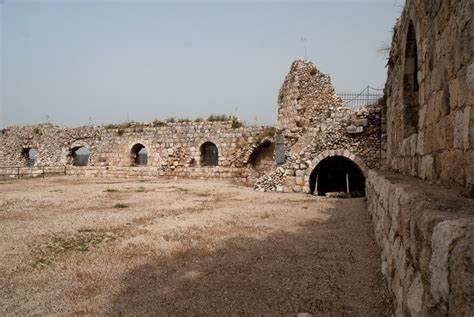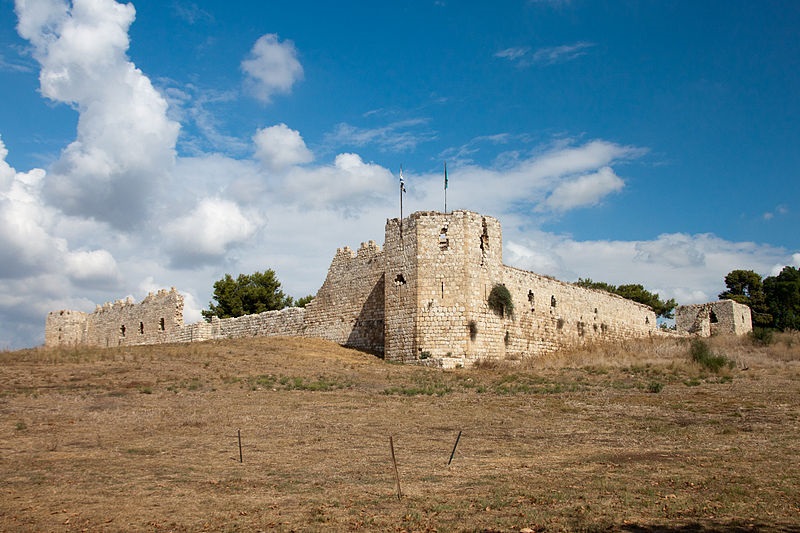And the Messenger answered and said, “Israel fled before the Philistines, and also the was a great defeat with the people, and also your two sons, Hophni and Phinechas, died, and the Ark of God was taken.
1 Samuel 4:17
1 And the words of Samuel were to all Israel. And Israel went out to meet the Philistines in battle, and they camped at the Even-Etzer, and the Philistines camped in Aphek.
The first part of this verse summarizes the last bit of Chapter 3. Samuel is now a prophet, he speaks to the people on behalf of God, and his words are for all Israel to hear, not just messages for important people. God’s words are to be shared with all.
Then the narrative transitions to a battle with the Philistines. The Philistines are one of several groups of “sea peoples,” maritime invaders into the ancient Near East from Europe. Evidence suggests the Philistines originated in the Agean Sea (modern day Greece). Around 1200 BCE they began invading and settling the coastal plain of modern day Israel, and were the foremost enemies of Israel during the time of the Judges, and in the books of Samuel.
Here the Philistines encamp at Aphek, a city on the inland side of the coastal plain, right before the rising of the central hill country, the heartland of Israel. It is clear that they intend to invade the hills. The Israelites with no formal military, muster a defense at a place called “the rock of help,” or in Hebrew ha-even ha-etzer. Many English translations call this place Ebenezer based on a transliteration of the Hebrew. The exact location of this Even-Etzer, is unknown but it was likely in the hills immediately above Aphek.
2 And the Philistines lined up to meet Israel, and the battle was drawn out, and Israel was struck before the Philistines, and they smote in the battleline, in the field, about four thousand men.
The battle does not go well for the Israelites, who lost roughly 4000 men during this battle. The Philistines are successful and are able to invade the heartland of Israel.
3 And the people came to the camp, and the Elders of Israel said, “Why did Adonai strike us today before the Philistines? Let us take for ourselves the ark of the Covenant of Adonai from Shiloh, and let it come in our midst and save us from the palm of our enemies.
In an act of desperation, the elders of the Israelites decide to go grab the Ark of the Covenant from the Tabernacle at Shiloh. The Ark represents God’s presence on Earth, or more accurately it represents God’s throne room on Earth. God is described as “seated between the Cherubim” on the top of the Ark. In the past, during the days of Moses and Joshua, the Ark of the Covenant was carried into battle to symbolize God’s presence fighting for Israel. However, in all of those situations God commanded the people to take the Ark into the battle.
Here the Elders are, at best, trying to force God to fight to defend them, or, at worst, seeing the Ark as a mystical weapon rather than the symbolic throne of God on Earth. It seems to be the latter, as they have even admitted that the Lord struck them before the Philistines. God wants them to fail, to learn humility, after being led by a prideful and corrupt priesthood.
4 And the people sent to Shiloh and brought from there the Ark of the Covenant of Adonai of Hosts, sitting between the Cherubim. And there the two sons of Eli, Hophni and Phinechas, were with the Ark of the Covenant of God.
Eli’s corrupt and wicked sons go into the Holy of Holies and bring out the Ark of the covenant. This is problematic for several reasons. First, only the high priest is allowed to enter the Holy of Holies, and even then, only once a year, unless God commands otherwise. Eli would be the only person allowed to enter that part of the Tabernacle. Second, the priests entering the Holy of Holies must be ceremonially pure, and without sin, which Hophni and Phinechas are both described as wicked men. God should have smote them for daring to enter the Holy of Holies in such a state. Instead, God waits and allows the ark to be taken to battle.
5 And it was that as the Ark of the Covenant of Adonai was brought into the camp, all Israel rejoiced a great rejoicing, and the earth shook. 6 And the Philistines heard the sound of the rejoicing, and they said, “What is this sound of rejoicing in the camp of the Hebrews?” And they learned that the Ark of Adonai came into the camp.
The Israelites bring the Ark to their camp at Even-etzer. In Hebrew it says that the Israelites yari’u a teru’ah gdolah. The Hebrew word ru’a (the root of yari’u and teru’ah), means to rejoice, to shout, to cheer, or to shout a battle cry. The idea is that the appearance of the Ark has rallied the Israelites so much so that the Philistines can hear the rallying cry.
The Philistines investigate the source of the battle cry, and find that the Ark of the Covenant has been brought to the battle. In the eyes of the Philistines, who routinely worship idols and statues, the Israelites have brought their God to the battle.
7 And the Philistines were afraid, for they said, “a god came into the camp.” And they said, “Woe to us! For it has not been like this since yesterday and three days ago. 8 Woe to us! Who will deliver us from the hand of these mighty gods? These are the gods that smote the Egyptians with all the plagues in the desert.
The Philistines have challenged champions of the God of Israel before, Samson is the prime example. However, they have never seen an idol of the God of Israel, and now the see the Ark, and assume it’s the idol of the Israelite God. If the Israelite God was able to do so much damage through a single warrior without an idol, they are terrified of what this God can do with what they assume is a physical idol on the battleground. They also have heard stories of the Ark of the Covenant from the times of Joshua and/or Moses and know the power that God has.
The phrase “since yesterday and three days ago,” is an odd wording in English, it could be that “three days ago” would be better translated “the day before yesterday” (I kept the “three days ago” translation to reflect the literal meaning of the word). As such it is the phrase “yesterday and the day before,” which is a figurative phrase meaning, “as far back as we can remember.”
The Philistines are panicking. Usually in the Bible, when the enemies of Israel start to panic, God brings victory to the Israelites.
9 “Encourage yourselves and become like men Philistines, lest you will serve the Hebrews, like they have served you. And become like men and fight.”
The Philistines rally themselves, something that doesn’t usually happen after the enemies of Israel become afraid.
10 And the Philistines fought, and struck Israel. And they fled each man to his tent. And there was a very great defeat. And thirty thousand men on foot fell from Israel.
Israel is defeated again, this time much worse than the previous defeat. God did not come to their aid, even when they brought out the Ark. The Israelites sought to use the ark as a weapon, or like a pagan idol, and it cost them dearly.
11 And the Ark of God was taken, and the two sons of Eli Hophni and Phinechas died.
This is a massive defeat that would have shaken the Israelites to their core. God has either allowed the Ark of the Covenant to be taken and seemingly abandoned his people, or he was not as strong as the gods of the Philistines. Neither option is very comforting. Of course, we know that this was part of God’s judgment on Israel and specifically on the wicked priesthood. Israel needed to be reminded of the God they serve.
12 And a man of Benjamin ran from the camp to and came to Shiloh in that day. And his robe was torn and there was dirt on his head. 13 And he came, and behold, Eli was sitting on his chair, by the road watching, for his heart was anxious for the Ark of God. And the man came and told the city, and all the city cried for help.
One man escaped the battle to inform the city of Shiloh what happened. This man ran to Shiloh, rather than to his hometown in Benjamin, which was in a different direction. He at least was not like the other Israelites who “ran to their own tents.”
Of course, this news is the worst news he could have delivered. The people at Shiloh start to cry for help. When Israel called out this way during the time of the Judges, God has almost always responded in some way.
14 And Eli heard the sound of the call for help. And he said, “What is the sound of this commotion?” And the man hastened and came and told Eli. 15 And Eli was ninety-eight years old, and his eyes were fixed, and he was not able to see.
Eli is very old and is now fully blind. The Hebrew says ‘einav komah, literally “his eyes stood,” implying that they have frozen in place as they ceased to function. When he hears the cries of the people of Shiloh, he naturally wants to know what is going on.
16 And the man said to Eli, “I am the one coming from the battle line, and I fled from the battle line today.” And he said, “What is the word my son?” 17 And the Messenger answered and said, “Israel fled before the Philistines, and also the was a great defeat with the people, and also your two sons, Hophni and Phinechas, died, and the Ark of God was taken. 18 And it was as he mentioned the Ark of God, he fell over the chair backwards by the side of the gate and broke his neck and died, for the man was old and heavy. And he judged Israel forty years.
The messenger relates to Eli the outcome of the battle, and it is so shocking that he falls off his chair and breaks his neck, fulfilling the prophecy that the entire house of Eli would be destroyed. Here we see that Eli is considered one of the Judges of Israel, judging them 40 years like most of the other Judges.
19 And his daughter-in-law, the wife of Phinechas was pregnant and abot to gave birth, and she heard the news of the taking of the Ark of God, and the death of her father-in-law and her husband, and she bent down and gave birth for her labor pains fell upon her. 20 And at the time of her death, those standing above her spoke, “Do not be afraid, for you have born a son.” But she did not answer, and she did not set her heart.
Eli’s daughter in law is having a horrible day. First, she learns that her husband and father-in-law, those who take care of her, are dead. A woman living without a husband or father-in-law had very little resources and options in this part of the ancient world, she literally lost everything that kept her safe and alive. Then she finds out that God has seemingly abandoned them, by allowing the ark to be taken, and Israel’s enemies are now pillaging the land. Finally, the stress of it all induces labor, and she gives birth to a son only to die shortly after childbirth.
This child is the one member of Eli’s family that God allows to survive, according to his warning given in chapter 2. Upon hearing that she has a son, she does not immediately give a response. The phrase, “she did not set her heart,” must be a figure of speech meaning something along the line of “she did not care.” Nothing seems to matter to her anymore.
21 And she called the boy ‘I-chavod, saying, “The glory left from Israel,” for the Ark of God was taken, and so was her father-in-law and her husband. 22 And she said, “The glory left from Israel, for the Ark of God was taken.
‘I-chavod (often written Ichabod) literally means “there is no glory.” She names her son this because “the glory (Hebrew, chavod) left from Israel.” The Ark of the Covenant represents the glory/presence of God on Earth, and it has been taken from Israel. The way she describes it leaving is with the Hebrew word galah, which means “to uncover.” God removing his glory was like ripping the roof off of the homes of the Israelites and exposing them to the dangers of the world.
God has allowed his people to face enormous disaster. The object that represents his glory has been carried away. But now his people cry out to him for help.



